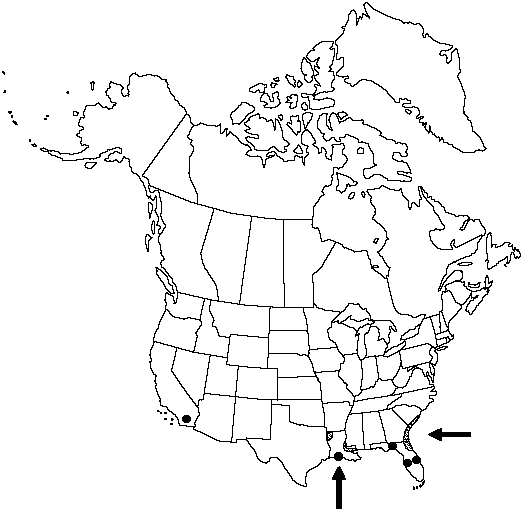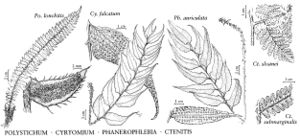Difference between revisions of "Cyrtomium falcatum"
Tent. Pterid. 86. 1836.
Basionym: Polypodium falcatum Linnaeus f. Suppl. Pl., 446. 1782
Treatment appears in FNA Volume 2.
FNA>Volume Importer |
FNA>Volume Importer |
||
| Line 51: | Line 51: | ||
|publication year=1836 | |publication year=1836 | ||
|special status= | |special status= | ||
| − | |source xml=https://jpend@bitbucket.org/aafc-mbb/fna-data-curation.git/src/ | + | |source xml=https://jpend@bitbucket.org/aafc-mbb/fna-data-curation.git/src/f50eec43f223ca0e34566be0b046453a0960e173/coarse_grained_fna_xml/V2/V2_82.xml |
|genus=Cyrtomium | |genus=Cyrtomium | ||
|species=Cyrtomium falcatum | |species=Cyrtomium falcatum | ||
Revision as of 20:53, 16 December 2019
Stem scales orange-brown, ovate with attenuate apices. Leaves 30–60(–100) cm. Pinnae bright green and shiny adaxially, 4–10(–12) pairs, ovate-attenuate, usually falcate, 4–8.5 cm, leathery, sometimes with short, basal, acroscopic lobe, margins often undulate or coarsely and irregularly dentate. Indusia brown, sometimes with blackish centers, not shriveled at maturity. n = 2n = 123, apogamous.
Habitat: Brick or stone walls, rocky areas, mesic forests, and coastal bluffs
Elevation: 0–100 m
Distribution

Calif., Fla., Ga., La., Miss., S.C., Europe, Asia.
Discussion
Cyrtomium falcatum is native to east Asia and widely escaped from cultivation. All plants in the flora appear to be the 32-spored, apogamous triploid.
Selected References
None.
Lower Taxa
None.
